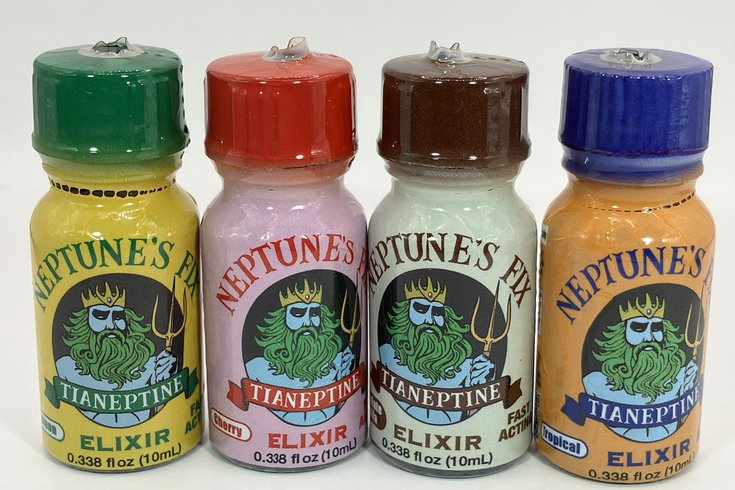
February 21, 2024
 Source/FDA
Source/FDA
Neptune's Fix is a brand of the drug tianeptine, which is not FDA-approved and has been linked to health complications in New Jersey. The liquids and tablets are sold at gas stations and other shops.
Products sold at New Jersey gas stations, convenience stores and smoke shops linked to a series of poisonings have prompted new warnings from federal health officials.
The flavored liquid shots and tablets, sold as Neptune's Fix, contain the drug tianeptine — a type of antidepressant that is not approved by the U.S. Food and Drug Administration. It's informally called "gas station heroin" because its effects can produce sensations of euphoria that mimic heavier opioids, potentially putting people at risk of abusing the substance, according to the National Institutes of Health.
In November, the FDA warned that Neptune's Fix was being illegally sold with claims to improve brain function and treat anxiety, depression, pain, opioid use disorder and other conditions. Some countries in Europe, Asia and Latin America have approved tianeptine as a depression treatment. The drug is viewed by some as a possible alternative to opioids that could be used to treat pain and manage withdrawal symptoms, but it has drawn scrutiny from U.S. regulators in recent years due to concerns about its safety and the risk of addiction. Nine states have banned it.
New data from the U.S. Centers for Disease Control and Prevention show a "sharp increase" in calls made to New Jersey poison centers about tianeptine. There's also evidence that Neptune's Fix products may contain other substances, including synthetic cannabis, that aren't listed on their labels.
Between last June and November, the CDC documented 20 calls made to New Jersey poison control centers for medical complaints related to tianeptine. The state's previous baseline had been two or fewer calls per year. Three of the calls were from people who had more than one exposure to the drug. The calls came from people who live throughout the state and ranged from 28 to 69 years old.
The cases documented by the CDC included complaints about seizures, loss of consciousness, heart issues and other medical problems linked to tianeptine products. There were 13 hospitalizations, including seven people who were intubated. Six people reported complications from taking tianeptine with other substances. No deaths were reported.
Fourteen of the cases were directly traced to Neptune's Fix, whose main distributor, Neptune Resources LLC, agreed to a voluntary recall of its elixirs and tablets in January. A second distributor, Super Chill Products, also is recalling its flavored elixirs after receiving a separate recall notice from the FDA. Many of these products also are sold online.
The CDC warned that tianeptine also is sold under other brand names, including Pegasus and Zaza. The agency said tianeptine products may be adulterated and could put people at risk of having serious medical problems.
In the past, the FDA has documented harmful effects of tianeptine including agitation, drowsiness, confusion, sweating, rapid heartbeat, high blood pressure, nausea, vomiting, slowed or stopped breathing, coma and death. The agency has urged consumers, distributors and retailers to immediately dispose of Neptune's Fix products or return them.
Some Neptune's Fix samples that were tested in a lab showed varying amounts of synthetic cannabinoids — manmade chemicals similar to those found in marijuana plants — while others contained only the listed ingredients tianeptine and kavain, the CDC said.
Some synthetic cannabinoid brands, such as K2 and Spice, are sold cheaply in gas stations and are considered potentially toxic. They've prompted health agencies to issue similar warnings in recent years due to health complications. Kavain comes from the dietary supplement kava, a pepper plant extract that has been linked to anxiety relief but is not FDA-approved. The FDA previously has warned that kava could be associated with liver injuries.
The New Jersey Department of Health did not immediately respond to a request for comment about the CDC's findings, which were reviewed by researchers at Rutgers University.